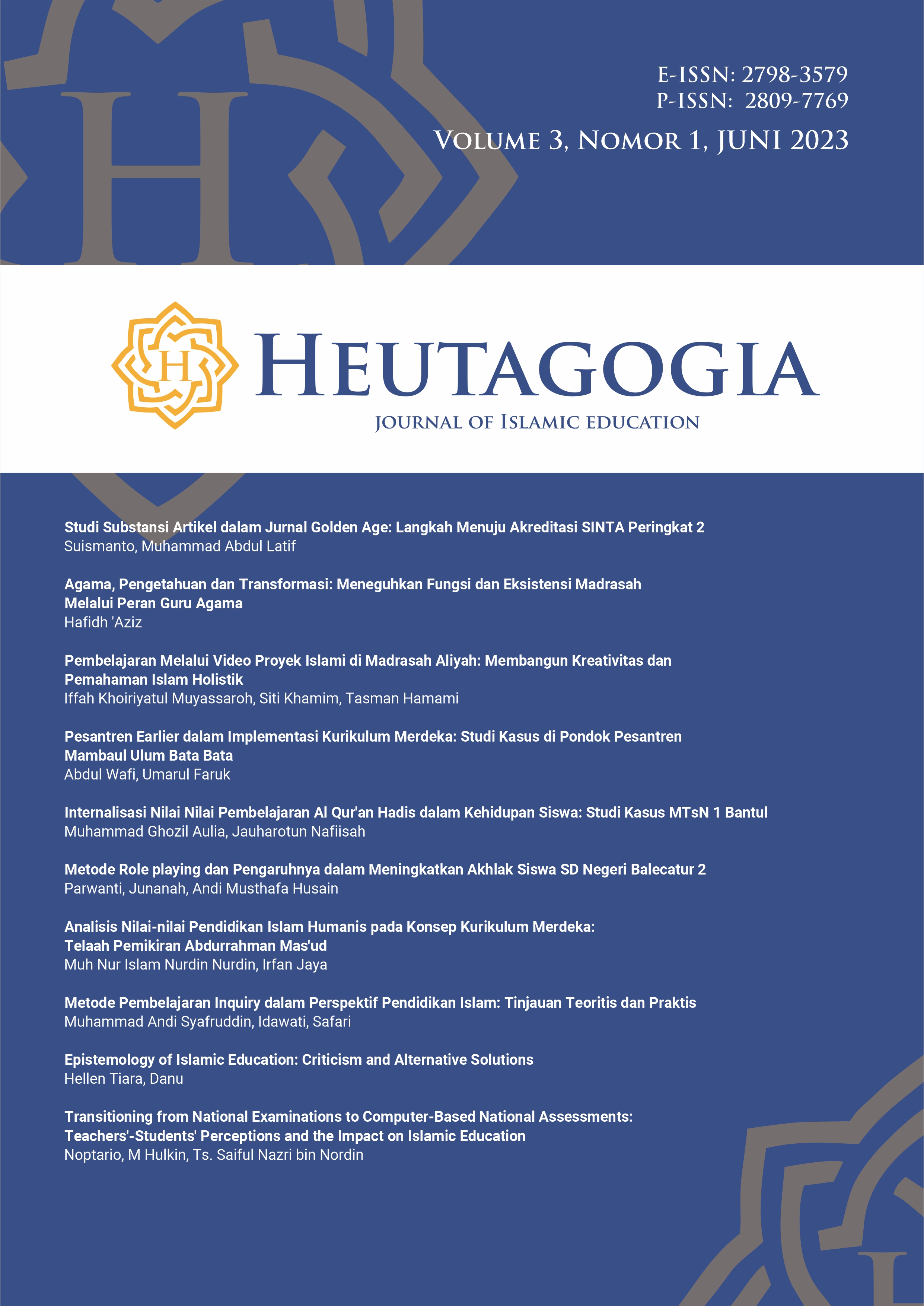Epistemology of Islamic Education: Criticism and Alternative Solutions
DOI:
https://doi.org/10.14421/hjie.2023.31-09Keywords:
Epistemology, Islamic Education, Epistemological CriticismAbstract
The purpose of this study is to critique the epistemology of Islamic education in the 21st century, analyze existing problems, and propose alternative solutions. This research employs a qualitative approach, using descriptive analysis methods and a literature review to explore various discussions on the epistemology of Islamic education. Data is validated through source triangulation and then analyzed through collection, presentation, and conclusion drawing. The findings indicate that, despite rapid advancements in education due to technology and globalization, there remain unresolved issues. Critiques of Islamic education epistemology still focus on the dominance of source and tool aspects in studying Islamic epistemology, which tends to be static and non-exploratory. Proposed solutions include an emphasis on empirically-based epistemology, theoretical intellectual knowledge, and a focus on student creativity. Furthermore, in the development of Islamic education curriculum, aspects that are dogmatic and transcendental need to be connected with the empirical world. This research has limitations in terms of scope and depth of analysis, but it has practical implications for the development of more relevant and contextual Islamic education.
References
Ahmed, F. "An Exploration of Naquib Al-Attas' Theory of Islamic Education as Ta'dīb as an 'Indigenous' Educational Philosophy." Educational Philosophy and Theory 50, no. 8 (2018): 786–94. https://doi.org/10.1080/00131857.2016.1247685.
Buchanan, R A. "Philosophy of Education in a New Key: Exploring New Ways of Teaching and Doing Ethics in Education in the 21st Century." Educational Philosophy and Theory 54, no. 8 (2022): 1178–97. https://doi.org/10.1080/00131857.2021.1880387.
Ermagusti, Ermagusti, Syafrial Syafrial, and Rahmad Tri Hadi. “Integrasi Teologi Islam, Sufisme, Dan Rasionalisme Harun Nasution.” TAJDID: Jurnal Ilmu Ushuluddin 21, no. 1 (2022): 180–208. https://doi.org/10.30631/tjd.v21i1.237.
Faiz, Aiman, and Imas Kurniawaty. “KONSEP MERDEKA BELAJAR PENDIDIKAN INDONESIA DALAM PERSPEKTIF FILSAFAT PROGRESIVISME.” Konstruktivisme : Jurnal Pendidikan Dan Pembelajaran 12, no. 2 (2020): 1–14. https://doi.org/10.35457/konstruk.v12i2.973.
Falikul Isbah, M. "Pesantren in The Changing Indonesian Context: History and Current Developments." Qudus International Journal of Islamic Studies 8, no. 1 (2020): 65–106. https://doi.org/10.21043/QIJIS.V8I1.5629.
Hakim, Moh. Nur. Sejarah Dan Peradaban Islam. Malang: UMM Press, 2003.
Hania, Irfan, and Suteja. “Pendidikan Islam Perspektif Al-Ghazali Dan Ibn Rusyd Serta Relevansinya Di Abad 21.” Heutagogia: Journal of Islamic Education 1, no. 2 (2021): 121–30. http://ejournal.uin-suka.ac.id/tarbiyah/HJIE/article/view/4667.
Hossain, F. M. Anayet. "A Critical Analysis of Empiricism." Open Journal of Philosophy 04, no. 03 (2014). https://doi.org/10.4236/ojpp.2014.43030.
Indarta, Yose, Nizwardi Jalinus, Waskito Waskito, Agariadne Dwinggo Samala, Afif Rahman Riyanda, and Novi Hendri Adi. “Relevansi Kurikulum Merdeka Belajar Dengan Model Pembelajaran Abad 21 Dalam Perkembangan Era Society 5.0.” Edukatif : Jurnal Ilmu Pendidikan 4, no. 2 (2022): 3011–24. https://doi.org/10.31004/edukatif.v4i2.2589.
Ismail, M.Z, T Lovat, O Ogunnaike, A Suhaimi, F Ahmed, K B Noaparast, R Hashim, et al. "The Role of Islamic Philosophy of Education in Aspiring Holistic Learning." Educational Philosophy and Theory 1, no. 1 (2017): 107–16. https://doi.org/10.1016/j.sbspro.2010.07.423.
Ismail, M Z. "Curriculum Content Evaluation Study of Bachelor of Education Program Specialization in Islamic Education with Islamic Education Philosophy." International Journal of Advanced Science and Technology 29, no. 6 (2020): 1673–80.
Lailatussaidah, Isri, Kambali, and Rusydi. “Konsep Humanisme Religius Sebagai Paradigma Pendidikan Islam Menurut Abdurrahman Mas’ Ud Dalam Konteks Pendidikan Modern.” Journal Islamic Pedagogia 2, no. 2 (2022): 63–71.
Leva, Mazda, Okta Safitri, Ali Mustadi, Heri Retnawati, and Universitas Negeri Yogyakarta. "The Role of Teachers in Implementation Social Care Education Character at Primary Schools" 6, no. 2 (2021): 39–50.
Lovat, T. "Gifted Education and Islamic Educational Philosophy: A Neat Convergence." Gifted Education International 39, no. 1 (2023): 47–60. https://doi.org/10.1177/02614294221125555.
Mohd Azaman, Faizatul Najihah, and Faudzinaim Badaruddin. "Spiritual Values In Human Capital Development According To Al-Ghazali." UMRAN: International Journal of Islamic and Civilizational Studies 3, no. 1 (March 3, 2016). https://doi.org/10.11113/umran2016.3n1.54.
Noventari, Widya. “Konsepsi Merdeka Belajar Dalam Sistem Among Menurut Pandangan Ki Hajar Dewantara.” PKn Progresif: Jurnal Pemikiran Dan Penelitian Kewarganegaraan 15, no. 1 (2020). https://doi.org/10.20961/pknp.v15i1.44902.
Nurhadi, M. “Pembentukan Karakter Religius Melalui Tahfidzul Qur’an: Studi Kasus Di MI Yusuf Abdussatar Kediri Lombok Barat.” Doctoral Dissertasion, UNiversitas Islam Negeri Maulana Malik Ibrahim Malang, 2015.
Nurkholis, Nurkholis. “PENDIDIKAN DALAM UPAYA MEMAJUKAN TEKNOLOGI.” Jurnal Kependidikan 1, no. 1 (1970). https://doi.org/10.24090/jk.v1i1.530.
Ojala, M. "Safe Spaces or a Pedagogy of Discomfort? Senior High-School Teachers' Meta-Emotion Philosophies and Climate Change Education." Journal of Environmental Education 52, no. 1 (2021): 40–52. https://doi.org/10.1080/00958964.2020.1845589.
Shofiyah, Shofiyah. “Prinsip – Prinsip Pengembangan Kurikulum Dalam Upaya Meningkatkan Kualitas Pembelajaran.” Edureligia; Jurnal Pendidikan Agama Islam 2, no. 2 (2018): 122–30. https://doi.org/10.33650/edureligia.v2i2.464.
Suhaimi, A. "Concept of Idealism Philosophy in Islamic Education According to Imam Al-Ghozali." Utopia y Praxis Latinoamericana 24 (2019): 359–69.
Suryaman, Maman. “Orientasi Pengembangan Kurikulum Merdeka Belajar.” In Prosiding Seminar Daring Nasional: Pengembangan Kurikulum Merdeka Belajar, 13–28. Pendidikan Bahasa dan Seni, Universitas Bengkulu, 2020.
Tejaningsih, Endah, Mudofir Mudofir, and Imam Makruf. “Manajemen Pengembangan Mutu Lulusan Madrasah Berbasis Pesantren Tasawuf.” Jurnal Pendidikan Agama Islam Al-Thariqah 7, no. 1 (2022): 218–30. https://doi.org/10.25299/al-thariqah.2022.vol7(1).9096.
Wulandari, Rizki Isma. “EPISTEMOLOGI THOMAS KUHN (PARADIGMA & REVOLUSI ILMU PENGETAHUAN) DAN PENERAPAN METODOLOGINYA DALAM PENDIDIKAN ISLAM.” Didaktik: Jurnal Ilmiah PGSD STKIP Subang 9, no. 2 (2023): 2911–36.
Wulandari, Wiwin, and Endang Fauziati. “Merdeka Belajar Dalam Perspektif Pendidikan Yang Membebaskan Paulo Freire.” Syntax Literate ; Jurnal Ilmiah Indonesia 7, no. 3 (2022).
Yahya, F. A. “Problem Manajemen Pesantren, Sekolah. Dan Madrasah: Problem Mutu Dan Kualitas Input-Proses-Ouput.” El-Tarbawi: Jurnal Pendidikan Islam 8, no. 1 (2015): 93–109. https://doi.org/10.20885/tarbawi.vol8.iss1.art6.
Zamzam, Jazirotul, and Mahasin Haikal. “Epistemologi Pluralistik Pendidikan Agama Islam Perspektif Abdurrahman Wahid.” Yupa: Historical Studies Journal 7, no. 1 (2023): 61–72. https://doi.org/doi.org/10.30872/yupa.v7i1.1835.
Downloads
Published
Issue
Section
License

This work is licensed under a Creative Commons Attribution-NonCommercial 4.0 International License.












